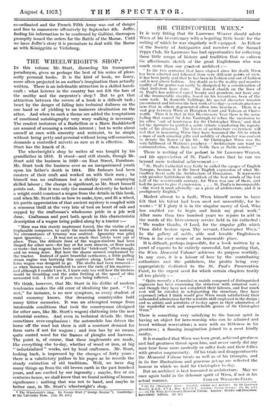THE WHEEL WRIGHT'S SHOP.*
IN this volume Mr. Sturt, discarding his transparent
pseudonym, gives us perhaps the best of his series of pleas- antly personal books. It is the kind of book, we fancy, more often projected in an author's imagination than actually written. There is an indefinable attraction in a skilled handi- craft : what loiterer in the country has not felt the lure of the smithy and the carpenter's shop ? But to get that attraction between the covers of a book is a difficult task ; beset by the danger of falling into technical dullness on the one hand or of yielding to an insincere idealization on the other. And when to such a theme are added the temptations of emotional autobiography very wary walking is necessary. The crudest imitators of a Barbellion or a Marie Bashkirtseff are assured of arousing a certain interest ; but to write about oneself at once with sincerity and restraint, to be simple without being petty and personal without being self-conscious, demands a controlled naivete as rare as it is effective. Mr.
Shut has the knack of it.
The wheelwright's shop he writes of was bought by his grandfather in 1810. It stood—and still stands, though Mr. Sturt sold the business in 1920—on East Street, Farnham. Mr. Sturt took the business over as an inexperienced youth upon his father's death in 1884. His forbears had been masters of their craft and worked on with their men ; he himself was no craftsman but a clerkly youth employing skilled labour ; the change is significant, as Mr. Sturt himself points out. But it was only the manual dexterity he lacked : a wright could construct a wagon from the details in this book, and when Mr. Sturt tells us how to make, tyre, and fit a wheel, his poetic appreciation of that ancient mystery is coupled with a sensuous thrill at the very bite of tool on heart of oak and capped by the craftsman's wholesome pride in a job well done. Craftsman and poet both speak in this characteristic description of a wagon being pulled along by a tractor :—
" Here was this stately implement forced, like the victim of an implacable conqueror, to carry the materials for its own undoing. No circumstance of tyranny was omitted. Ignominy was piled upon ignominy. . . . It was not so much that bricks were out of place. True, the delicate lines of the wagon-timbers had been shaped for other uses—for hay or for corn sheaves, or flour sacks or roots—but wagons have been used for brick-cart ' often enough, and no wrong done. But here the shame seemed emphasized by the tractor. Instead of quiet beautiful carthorses, a little pulling steam engine was hurrying this captive along, faster than ever farm wagon was designed to go. The shafts had been removed— as when Shmson was mutilated to serve the ends of his masters— and although I couldn't see it, I knew only too well how the timbers would be trembling and the axles fretting at the speed of this unwonted toil. I felt as if pain was being inflicted. . . . "
We think, however, that Mr. Sturt in his dislike of modern tendencies makes the old error of idealizing the past. " Un- rest," for instance, is no new symptom, as every student of rural economy knows. Our dreaming countrysides hold many bitter memories. It was an attempted escape from intolerable conditions that took the countryman (designed for other uses, like Mr. Sturt's wagon) clattering into the new industrial centres. And even in technical details Mr. Sturt sometimes over-emphasizes : the automobile has driven the horse off the road but there is still a constant demand for farm carts if not for wagons; and iron has by no means quite ousted wood for the frames of ploughs and harrows. The point is, of course, that these implements are made, like everything else to-day, whether of wood or iron, at big " industrialized " works, not by local craftsmen. Mr. Sturt, looking back, is impressed by the changes of forty years : there is a valedictory pathos in his pages as he records the steady extinction of old traditions. Well, we have dug many things up from- the old brown earth in the past hundred years, and are excited by our ingenuity ; maybe, five or six centuries hence, we shall know that we found nothing of human significance : nothing that was not to hand, and maybe in better case, in Mr. Sturt's wheelwright's shop.
• The Wheelwright's Shop. By George Start (" George Bourne"). Cambridge : at the University Press. 1125. Od. net.)


































 Previous page
Previous page